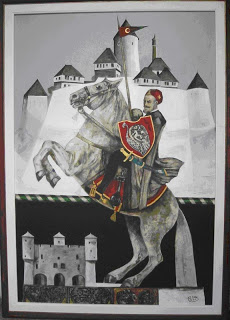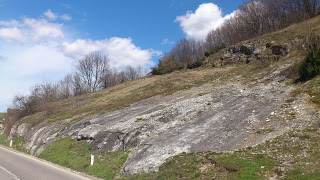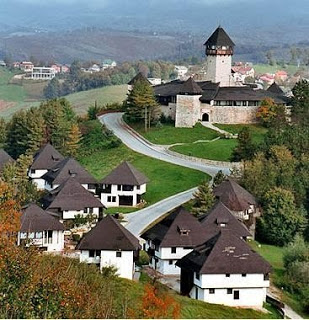Dear God, who was that hero?
It was Mujo Hrnjica of Kladuša.
Even though Mujo Hrnjica is not a mythological character but a real, historical figure, his life is interwoven from beginning to the end with a lot of mystical content which makes him an interesting figure about which one can write a lot.
What Hercules was for the ancient world Mujo Hrnjica is for the Bosnian world. Symbol of courage, a hero of great strength and a dangerous enemy to those that dislike his people. Because of all of those characteristics many Bosnian women named their son's Mujo which was a symbol of great strength and might and it contained prophylactic power against evil and disease.
Historical tradition about Mujo begun in the fall of 1637 when Mujo's uncle Hurem-aga Kozlica brought his two young nephews, who lost their father in the war, from Udbina to Velika Kladuša. The older boy was called Mustafa, but he was called Mujo and the younger one Halil. Besides being younger, Halil was thinner and less bulky during childhood, since his mother couldn't breast feed him because of the great grief she felt for her killed husband, and Halil didn't accept milk from any other woman. That's why they fed him with cow's and goat's milk which brought him the name Stalled Halil or Ugojeni Halil.
According to legend, in Velika Kladuša Mujo and Halil were met by a mountain faery (Gorska vila), calling them with a song in early dawn. She brought them to the river Kladušnica, washed them with dew and fed them with faery milk. Halil didn't want to drink milk, he drank the dew instead while Mujo liked the faery milk very much and drank a lot of it. Because Halil took the dew from the faery he grew into a very handsome young man, all the girls in Velika Kladuša yearned for him, calling him and falling into hysteria once they saw him, Unlike him, Mujo gained enormous physical strength which was given to him by the faery milk. He had a stern and piercing gaze, the one possessed by warriors.
In that sense the mountain faery became the second mother to the future heroes who protected Kladuša fort from the enemy. It is interesting to note that the faeries were mentioned as messengers in songs which transferred news from one warrior to the other and helped defeat the enemies or to explain their tricks and ambushes. How popular the faery cult was is best witnessed by the medieval city Vrnograč, 16 km away from Velika Kladuša, which was according to legend built by faeries. That's why it is called faery town.
The tradition about Mujo and the faeries is nothing more than an old Illyrian legend since Mujo's physical appearance is that of a warrior; he's tall, has thick dark hair, a moustache and a beard and strong arms. It's no coincidence that faeries are traditionally tied to Mujo since sine in the Illyrian times the cult of warrior was cherished which was closely associated with the cult of deities, especially the main one Vidasus among whom water nymphs were depicted i.e. faeries. In epic poems numerous encounters of Mujo and the faeries is mentioned, where they communicate and where the faeries heal Mujo's wounds gained in battle. How familiar he is with the faery world, their capabilities and character is best depicted in a poem in which Mujo like a skilled wizard manages to outwit the faeries transformed into goats.
According to legend, Mujo Hrnjica always carried an amulet with him on the right side of his suit. The amulet wasn't Islamic in content like the famous amulet-shirt of captain Husien Gradaščević, but ancient which stems from the cult of mother earth. It's a small red bag which contained 9 wheat kernels.
Wheat as one of the largest gifts of nature is a symbol of the cult of mother goddess, to whom faeries belong. All of this data confirms that among the Bosnian folk, through long continuity, the ancient tradition and beliefs were preserved. As the legend tells, the enemies found out what was protecting Mujo from death, through venal servants the enemies got a hold of Mujo's amulet. Apparently, the amulet was stolen a day before he was killed.
It was Mujo Hrnjica of Kladuša.
Even though Mujo Hrnjica is not a mythological character but a real, historical figure, his life is interwoven from beginning to the end with a lot of mystical content which makes him an interesting figure about which one can write a lot.
What Hercules was for the ancient world Mujo Hrnjica is for the Bosnian world. Symbol of courage, a hero of great strength and a dangerous enemy to those that dislike his people. Because of all of those characteristics many Bosnian women named their son's Mujo which was a symbol of great strength and might and it contained prophylactic power against evil and disease.
Historical tradition about Mujo begun in the fall of 1637 when Mujo's uncle Hurem-aga Kozlica brought his two young nephews, who lost their father in the war, from Udbina to Velika Kladuša. The older boy was called Mustafa, but he was called Mujo and the younger one Halil. Besides being younger, Halil was thinner and less bulky during childhood, since his mother couldn't breast feed him because of the great grief she felt for her killed husband, and Halil didn't accept milk from any other woman. That's why they fed him with cow's and goat's milk which brought him the name Stalled Halil or Ugojeni Halil.
According to legend, in Velika Kladuša Mujo and Halil were met by a mountain faery (Gorska vila), calling them with a song in early dawn. She brought them to the river Kladušnica, washed them with dew and fed them with faery milk. Halil didn't want to drink milk, he drank the dew instead while Mujo liked the faery milk very much and drank a lot of it. Because Halil took the dew from the faery he grew into a very handsome young man, all the girls in Velika Kladuša yearned for him, calling him and falling into hysteria once they saw him, Unlike him, Mujo gained enormous physical strength which was given to him by the faery milk. He had a stern and piercing gaze, the one possessed by warriors.
In that sense the mountain faery became the second mother to the future heroes who protected Kladuša fort from the enemy. It is interesting to note that the faeries were mentioned as messengers in songs which transferred news from one warrior to the other and helped defeat the enemies or to explain their tricks and ambushes. How popular the faery cult was is best witnessed by the medieval city Vrnograč, 16 km away from Velika Kladuša, which was according to legend built by faeries. That's why it is called faery town.
The tradition about Mujo and the faeries is nothing more than an old Illyrian legend since Mujo's physical appearance is that of a warrior; he's tall, has thick dark hair, a moustache and a beard and strong arms. It's no coincidence that faeries are traditionally tied to Mujo since sine in the Illyrian times the cult of warrior was cherished which was closely associated with the cult of deities, especially the main one Vidasus among whom water nymphs were depicted i.e. faeries. In epic poems numerous encounters of Mujo and the faeries is mentioned, where they communicate and where the faeries heal Mujo's wounds gained in battle. How familiar he is with the faery world, their capabilities and character is best depicted in a poem in which Mujo like a skilled wizard manages to outwit the faeries transformed into goats.
According to legend, Mujo Hrnjica always carried an amulet with him on the right side of his suit. The amulet wasn't Islamic in content like the famous amulet-shirt of captain Husien Gradaščević, but ancient which stems from the cult of mother earth. It's a small red bag which contained 9 wheat kernels.
Wheat as one of the largest gifts of nature is a symbol of the cult of mother goddess, to whom faeries belong. All of this data confirms that among the Bosnian folk, through long continuity, the ancient tradition and beliefs were preserved. As the legend tells, the enemies found out what was protecting Mujo from death, through venal servants the enemies got a hold of Mujo's amulet. Apparently, the amulet was stolen a day before he was killed.






» Love spell with menstrual blood
» Bacanje graha - zavirimo malo u sudbinu!
» Sanovnik - tumačenje snova
» Velike čarolije sa nožem
» PAGANSKI/VJEŠTIČJI TALISMANI I AMULETI (Bosnian/English)
» Solju protiv magije
» MAGIC FOR EVERY WITCH
» Molitvom i svijećom uklonite zlo i lošu sreću